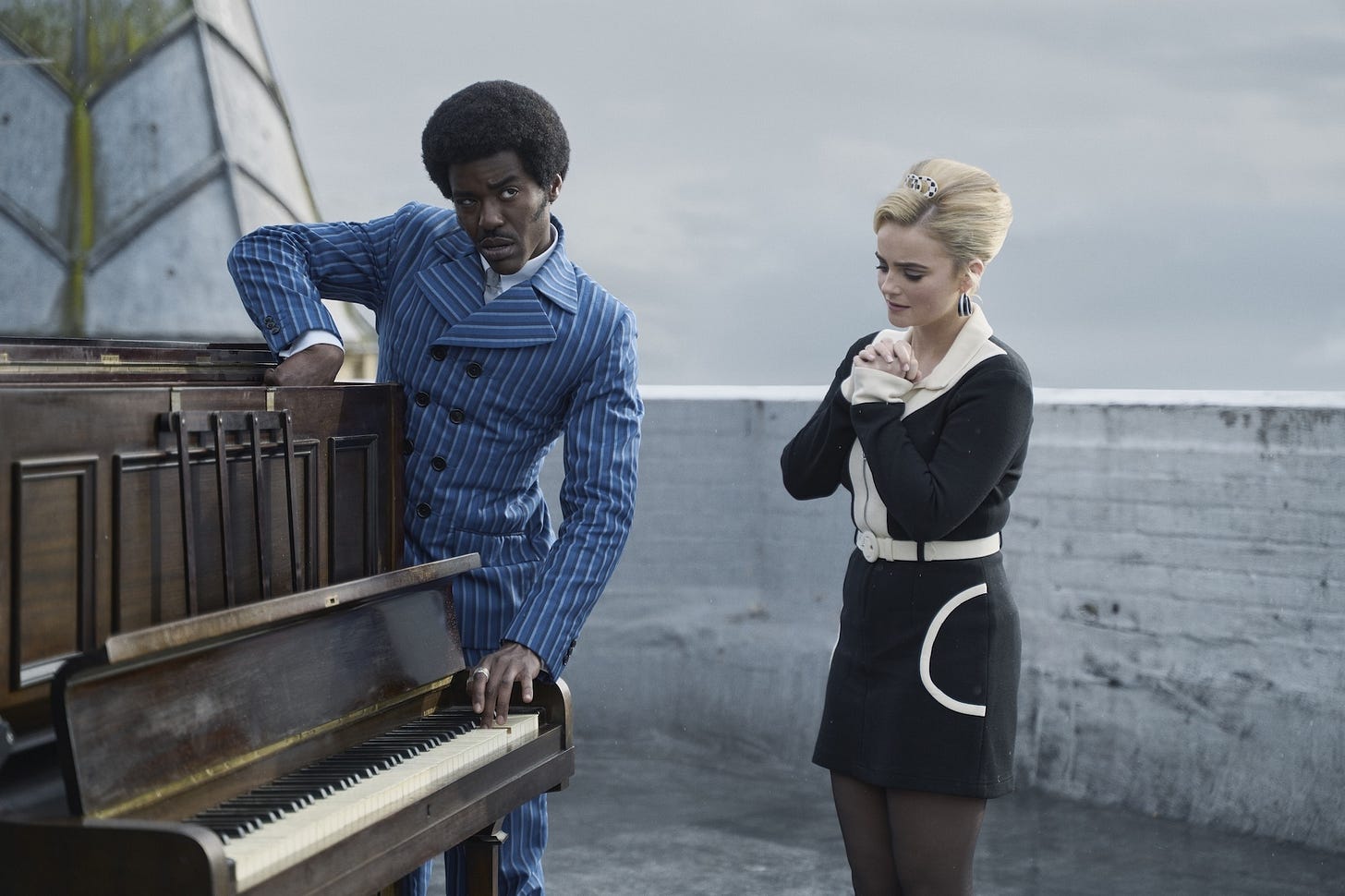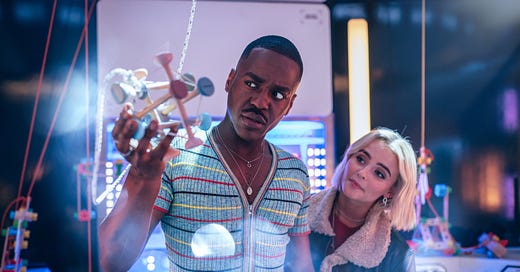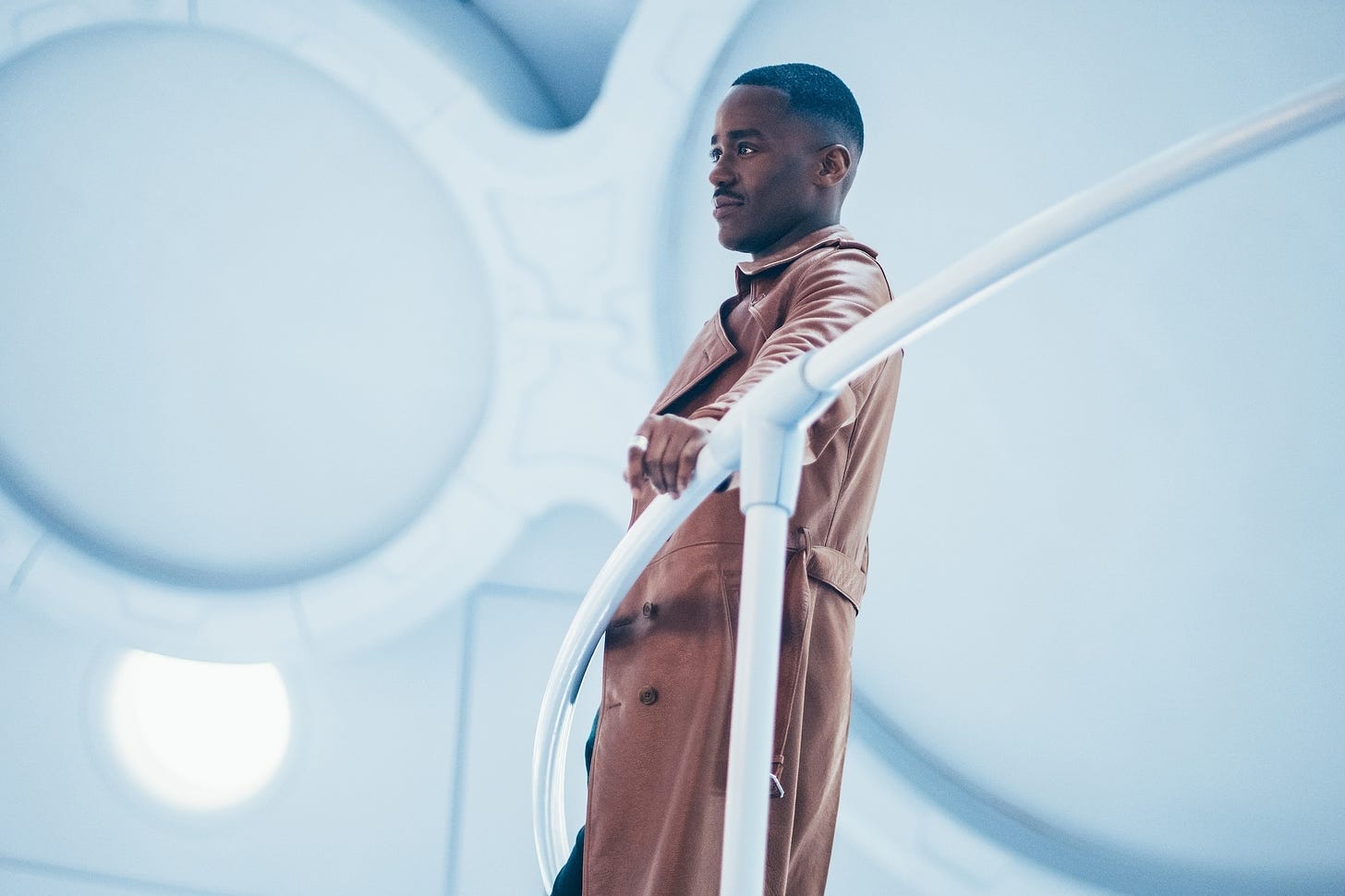'Doctor Who' Revived My Creative Spirit - A Bit
Doctor Who is back with more heartfelt, timey wimey adventures, with Ncuti Gatwa as the Doctor and Millie Gibson as Ruby Sunday.
If I’m honest, it hasn’t been the easiest to write on here. Well, it hasn’t been as easy as I thought it would. I always imagined I would love having a blog-like, relaxed place to build a community writing about what I love. While that is very much happening, imposter syndrome is already very much a thing, and writing here lets it all dial up to 11 for some reason. So, I wind up not giving myself as much creative freedom over here as I like. I started to question whether fostering this space was even a good idea. After all, am I even a good writer? Who would want to read my newsletter? You know, all the usual writer-adjacent thoughts that like to sync up with Sunday Scaries for optimal stress and lack of creativity.
And then I read a book, listen to a song or podcast, or watch a movie or TV show that reaches way down deep into my heart and reminds me why art and storytelling matter. They somehow cut through the noise in my brain to tell me this newsletter is a good idea. I only have to give myself a chance to notice, too.
This week, the TV show that did that for me was Doctor Who.
I’ve been anticipating this season for quite some time. Well, ever since BBC announced that Sex Education’s Ncuti Gatwa would be the new Doctor. Gatwa is a standout performer on the Netflix teen drama. It’s one of my favorite shows of all time. I worship the first three seasons and rewatch them constantly. As soon as I heard that Gatwa would take over the T.A.R.D.I.S., I knew this season would be a favorite, no matter where the show took the Doctor.
But the first two episodes of this new season — a first season, once again — changed my mind, reminding me why I like this wacky, sci-fi TV show.
I should say that, unfortunately, I’m not an encyclopedic Doctor Who fan. I wish I could remember all the details about this show. It would only enhance my viewing experience, but I often defer to many knowledgeable Internet pages when I watch episodes with lots of lore. In that sense, it’s nice that “Space Babies” and “The Devil’s Chord” are soft reboots of the franchise, with reintroductions to the Doctor’s backstory and more. I could keep up!
So, don’t expect this post to be a thorough, lore-based review. Instead, this post is about how Doctor Who, like it has so many times in the past, has given me a bit of extra hope. This time, that optimism translates to this very newsletter.
“Space Babies,” written by Russell T. Davies and directed by Julie Anne Robinson, surprised me a bit — even more on a rewatch. It instantly reassured me that Ncuti Gatwa and Millie Gibson are the dynamic duo this show needs to drive this new era. Their chemistry and energy constantly match one another. Through and through, they are the Doctor and companion pairing that pushes buttons out of pure curiosity. Gatwa and Gibson are great with the comedic timing and physical comedy, but how they land somber beats makes me lean into the show even more.
I stayed away from the clip above after it dropped because I wanted to be surprised when the episodes premiered. I’m glad I did that because that scene is even better in context. Coming off of how the Doctor tells Ruby that their family died in a genocide, this definition of the Doctor’s role brought tears to my eyes. In fairness, and to quote Graham from The Holiday, “I’m a massive weeper.” So, it could very well just be me, but I only kept spontaneously tearing up from here.
I’m sorry! Am I supposed to hear the Doctor tell Captain Poppy, “Nobody grows up wrong. You are what you are, and that is magnificent,” while celebrating their own individuality as a superpower and not cry?
Then, “Space Babies” had to go and tell “a children’s story come to life” with a Bogeyman made of bogies and a flawed and lovable supernanny played by the consistently brilliant Golda Rosheuvel. As Ruby states, “Babies need fiction. They need stories. They need monsters.” It may seem silly, but that made me think about how I’ve been healing my relationship with reading. I was an English major in college, and as much as I loved it and wouldn’t want to do anything else, it made reading sometimes feel like a chore. I never fell out of love with reading because that would be impossible. I just slowed down a lot more than I’d like.
Only recently have I started reading books at the same frequency I did in grade school. Then, meeting reading goals meant Accelerated Reading Program parties in the gym with my friends and music and ice cream and pizza and taking turns on those scooter boards that always ended with me running over my fingers.
Without that fun foundation of fiction, stories, and monsters from the books I read growing up that got me into those AR parties, I wouldn’t have wanted to become an English major. I wouldn’t want to read and study literature at all, let alone for good grades in required courses. I wouldn’t have the tools I do now to analyze and critique media thoughtfully. I wouldn’t have the career that I do.
I wouldn’t be a writer of any kind if I were never that kid who loved stories, and Doctor Who’s “Space Babies” reminded me of that when I was feeling a bit jaded.
Then, “The Devil’s Chord,” written by Russell T. Davies and directed by Ben Chessell, came in to finish the one-two punch I didn’t know I needed. Jinkx Monsoon is captivating and convincing as the uber-powerful Maestro who breaks the fourth wall and steals music from the world. So, when the Doctor and Ruby travel in time and space to EMI Recording Studios (Not yet Abbey Road Studios) on February 11, 1963, to see The Beatles record their debut album, they’re disappointed to find that “Everything’s gone dull” without music. Paul McCartney refers to an artistic job as “a last gasp” before settling on “a proper job,” and John Lennon can’t believe Ruby when she tells him, “We need you.”

Doctor Who’s John Lennon says that all he wants is to go home and be with a woman he loves, yet asks, “But, then, why do I wake up crying?” The show spotlights how artistic endeavors aren’t pitstops to a more traditional path; they can be it for people. Creative jobs can add to a person’s life, paralleling the fulfillment of fostering loving relationships. Moreover, Doctor Who sees creativity — stories and music — as an integral, life-saving part of the universe.
Why else can Ruby, the only human with music left in her heart at one point, bring people together through the song she wrote for her friend experiencing heartbreak? Why else does John Lennon find “the lost chord” — with Paul McCartney — to save the Doctor, Ruby, and the universe by banishing Maestro? “The Devil’s Chord” presents music as a source of connectivity that keeps the human race from going “sour” and the world from “darkening.”
Of course, “Space Babies” and “The Devil’s Chord” take the themes and lessons to sci-fi extremes, but the heart of their metaphors stands. It even sings (“There’s Always a Twist at the End” has no right being THAT good!).
It only takes a quick Google search to see that the state of journalism isn’t the best right now. Disheartening layoffs occur nearly daily, and everything feels a bit unsteady. So, I guess questioning a job in a creative field isn’t surprising. Still, finding motivation isn’t as easy as it is in a 52-minute episode that wraps up with a musical number. Sometimes, writing one bad sentence is a win. Other times, writing a post about how two Doctor Who episodes make me feel less crumby about creative jobs and their places in the world is an accomplishment. Because of that, I’m genuinely excited to see where my next post takes me, just like the Doctor and Ruby on the T.A.R.D.I.S. during this season of Doctor Who.
💌 Shelby
*Featured Picture Shows: "Space Babies" The Doctor (Ncuti Gatwa) and Ruby Sunday (Millie Gibson). Courtesy of BBC/Disney+.





